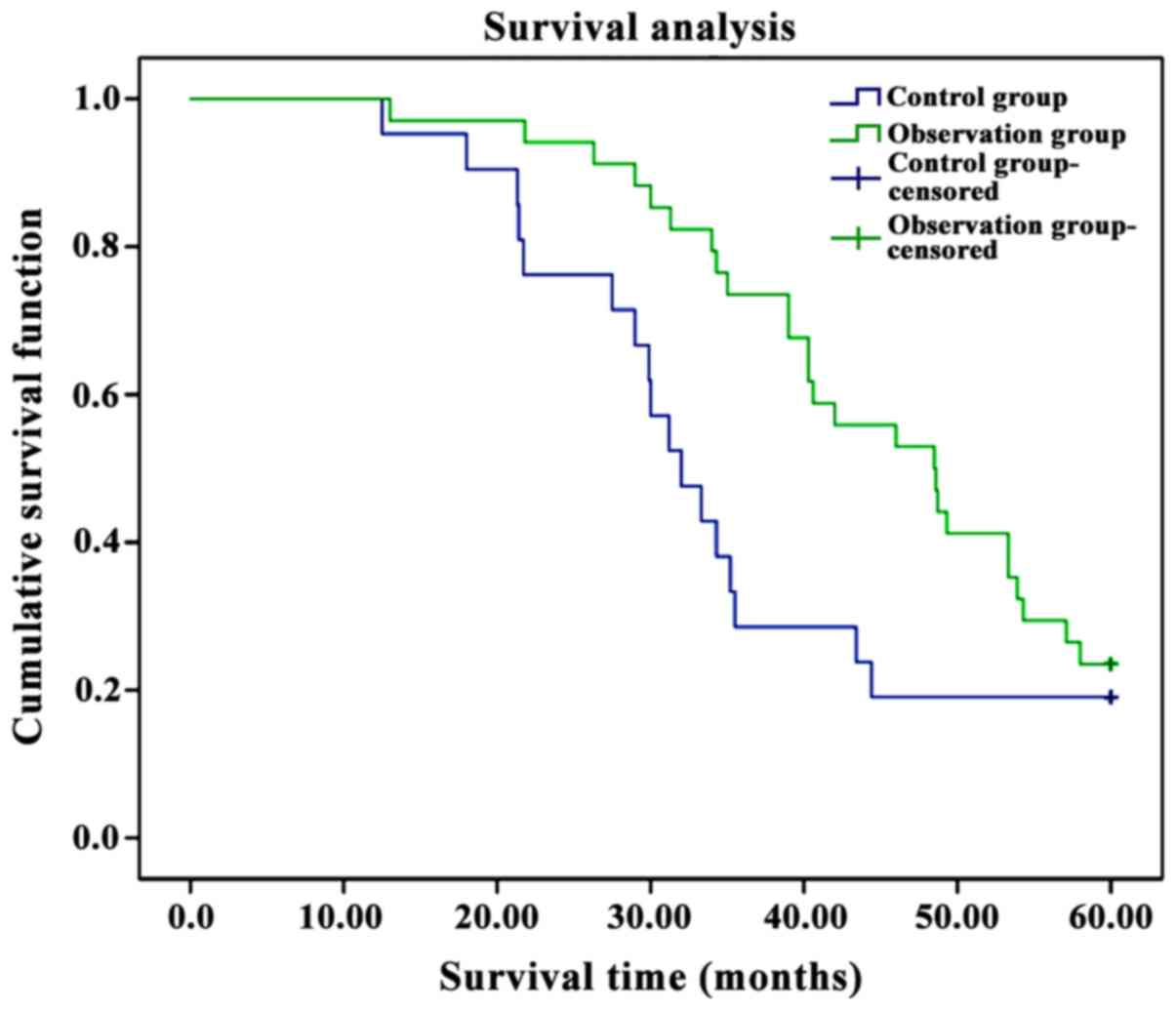|
1
|
Borghaei H, Paz-Ares L, Horn L, Spigel DR,
Steins M, Ready NE, Chow LQ, Vokes EE, Felip E, Holgado E, et al:
Nivolumab versus docetaxel in advanced nonsquamous non-small-cell
lung cancer. N Engl J Med. 373:1627–1639. 2015. View Article : Google Scholar : PubMed/NCBI
|
|
2
|
D'Addario G, Früh M, Reck M, Baumann P,
Klepetko W and Felip E: ESMO Guidelines Working Group: Metastatic
non-small-cell lung cancer: ESMO Clinical Practice Guidelines for
diagnosis, treatment and follow-up. Ann Oncol. 21 Suppl
5:v116–v119. 2010. View Article : Google Scholar : PubMed/NCBI
|
|
3
|
Garon EB, Rizvi NA, Hui R, Leighl N,
Balmanoukian AS, Eder JP, Patnaik A, Aggarwal C, Gubens M, Horn L,
et al: KEYNOTE-001 Investigators: Pembrolizumab for the treatment
of non-small-cell lung cancer. N Engl J Med. 372:2018–2028. 2015.
View Article : Google Scholar : PubMed/NCBI
|
|
4
|
Sprung J, Scavonetto F, Yeoh TY, Kramer
JM, Karnes RJ, Eisenach JH, Schroeder DR and Weingarten TN:
Outcomes after radical prostatectomy for cancer: a comparison
between general anesthesia and epidural anesthesia with fentanyl
analgesia: a matched cohort study. Anesth Analg. 119:859–866. 2014.
View Article : Google Scholar : PubMed/NCBI
|
|
5
|
Klapper J and D'Amico TA: VATS versus open
surgery for lung cancer resection: Moving toward a minimally
invasive approach. J Natl Compr Canc Netw. 13:162–164. 2015.
View Article : Google Scholar : PubMed/NCBI
|
|
6
|
Masters GA, Temin S, Azzoli CG, Giaccone
G, Baker S Jr, Brahmer JR, Ellis PM, Gajra A, Rackear N, Schiller
JH, et al: American Society of Clinical Oncology Clinical Practice:
Systemic Therapy for Stage IV Non-Small-Cell Lung Cancer: American
Society of Clinical Oncology Clinical Practice Guideline Update. J
Clin Oncol. 33:3488–3515. 2015. View Article : Google Scholar : PubMed/NCBI
|
|
7
|
Travis WD, Travis LB and Devesa SS: Lung
cancer. Cancer. 75 Suppl:191–202. 1995. View Article : Google Scholar : PubMed/NCBI
|
|
8
|
Thomas A, Liu SV, Subramaniam DS and
Giaccone G: Refining the treatment of NSCLC according to
histological and molecular subtypes. Nat Rev Clin Oncol.
12:511–526. 2015. View Article : Google Scholar : PubMed/NCBI
|
|
9
|
Grimminger PP, Maus MK, Schneider PM,
Metzger R, Hölscher AH, Sugita H, Danenberg PV, Alakus H and
Brabender J: Glutathione S-transferase PI (GST-PI) mRNA expression
and DNA methylation is involved in the pathogenesis and prognosis
of NSCLC. Lung Cancer. 78:87–91. 2012. View Article : Google Scholar : PubMed/NCBI
|
|
10
|
Black RC and Khurshid H: NSCLC: An update
of driver mutations, their role in pathogenesis and clinical
significance. R I Med J (2013). 98:25–28. 2015.PubMed/NCBI
|
|
11
|
Van Der Steen N, Rolfo C, Giovannetti E,
Reclusa P, Peters GJ and Pauwels P: P2.09: cMET in NSCLC:
Expression, amplification and mutations: track: biology and
pathogenesis. J Thorac Oncol. 11:S221–S222. 2016. View Article : Google Scholar : PubMed/NCBI
|
|
12
|
Seok Y, Cho S, Lee JY, Yang HC, Kim K and
Jheon S: The effect of postoperative change in bronchial angle on
postoperative pulmonary function after upper lobectomy in lung
cancer patients. Interact Cardiovasc Thorac Surg. 18:183–188. 2014.
View Article : Google Scholar : PubMed/NCBI
|
|
13
|
Cheng YD, Duan CJ, Dong S, Zhang H, Zhang
SK, Wang SQ and Zhang CF: Clinical controlled comparison between
lobectomy and segmental resection for patients over 70 years of age
with clinical stage I non-small cell lung cancer. Eur J Surg Oncol.
38:1149–1155. 2012. View Article : Google Scholar : PubMed/NCBI
|
|
14
|
Laursen LØ, Petersen RH, Hansen HJ, Jensen
TK, Ravn J and Konge L: Video-assisted thoracoscopic surgery
lobectomy for lung cancer is associated with a lower 30-day
morbidity compared with lobectomy by thoracotomy. Eur J
Cardiothorac Surg. 49:870–875. 2016. View Article : Google Scholar : PubMed/NCBI
|
|
15
|
Goto T, Kadota Y, Mori T, Yamashita S,
Horio H, Nagayasu T and Iwasaki A: Video-assisted thoracic surgery
for pneumothorax: Republication of a systematic review and a
proposal by the guideline committee of the Japanese association for
chest surgery 2014. Gen Thorac Cardiovasc Surg. 63:8–13. 2015.
View Article : Google Scholar : PubMed/NCBI
|
|
16
|
Hong Y and Rurong W: Systemic and alveolar
inflammatory response in the dependent and nondependent lung in
patients undergoing lung resection surgery. Eur J Anaesthesiol.
33:63–64. 2016. View Article : Google Scholar : PubMed/NCBI
|
|
17
|
Zhang J, Wang X, Zhang Y, Wu J and Zhou N:
Leucine-rich repeats and immunoglobulin-like domains protein 1 and
fascin actin-bundling protein 1 expression in nonsmall cell lung
cancer. J Cancer Res Ther. 12 Suppl:C248–C251. 2016. View Article : Google Scholar : PubMed/NCBI
|
|
18
|
Feng Q, Wei H, Morihara J, Stern J, Yu M,
Kiviat N, Hellstrom I and Hellstrom KE: Th2 type inflammation
promotes the gradual progression of HPV-infected cervical cells to
cervical carcinoma. Gynecol Oncol. 127:412–419. 2012. View Article : Google Scholar : PubMed/NCBI
|
|
19
|
Kayhan Erdogan G, Gul M, Kayhan B, Gedik
E, Ozgul U, Kurtoglu EL, Durmus M and Ersoy MÖ: Dexmedetomidine
ameliorates TNBS-induced colitis by inducing immunomodulator
effect. J Surg Res. 183:733–741. 2013. View Article : Google Scholar : PubMed/NCBI
|
|
20
|
Jackute J, Zemaitis M, Pranys D,
Sitkauskiene B, Miliauskas S, Bajoriunas V, Lavinskiene S and
Sakalauskas R: The prognostic influence of tumor infiltrating
Foxp3(+)CD4(+), CD4(+) and CD8(+) T cells in resected non-small
cell lung cancer. J Inflamm (Lond). 12:632015. View Article : Google Scholar : PubMed/NCBI
|















